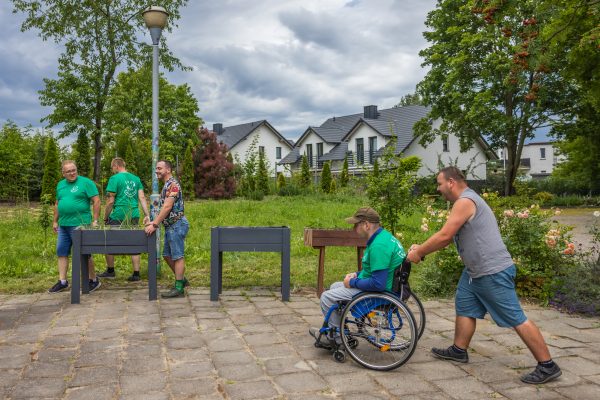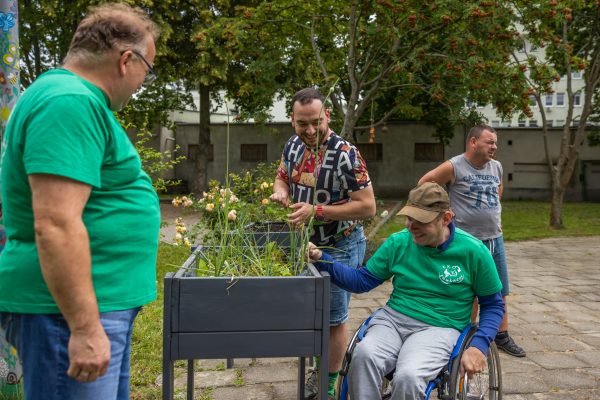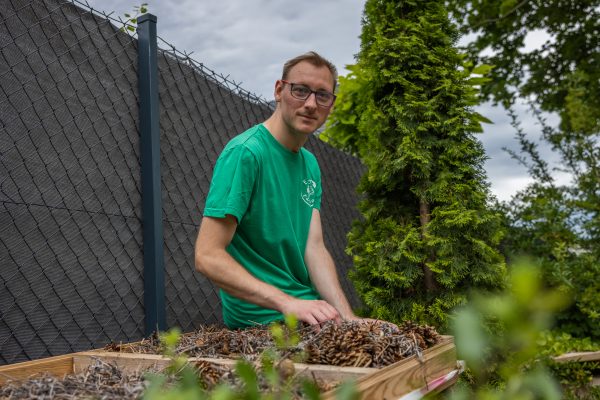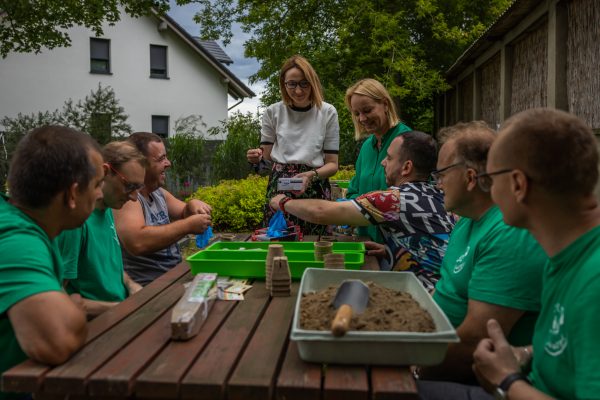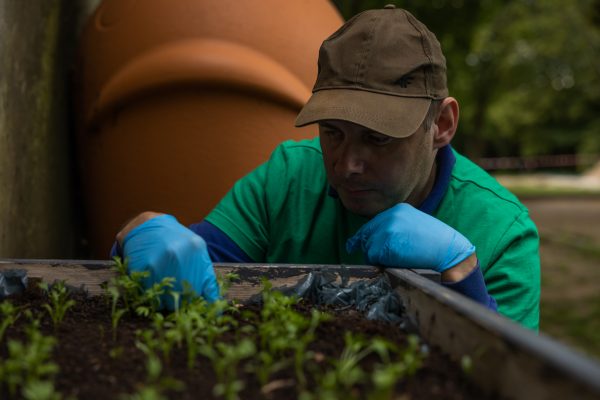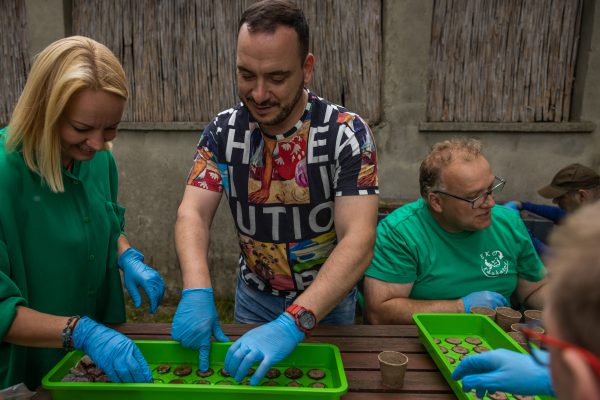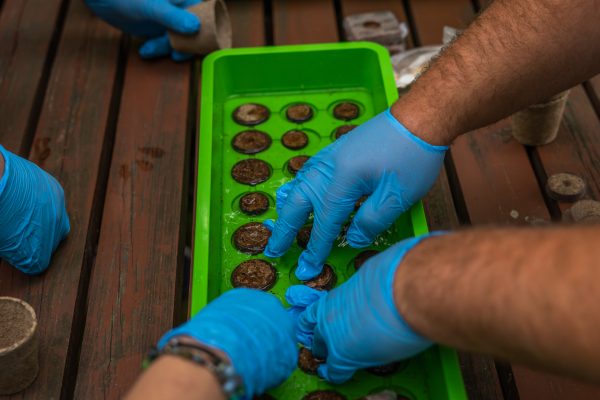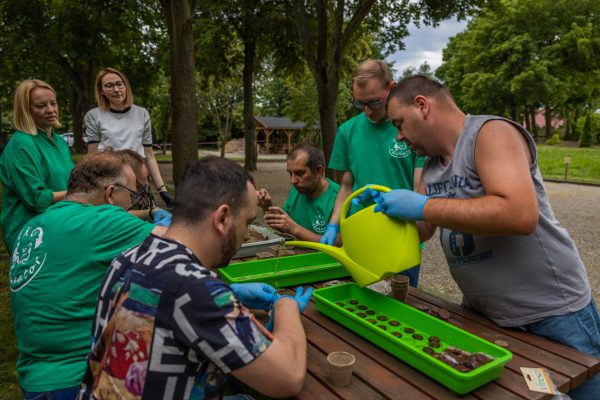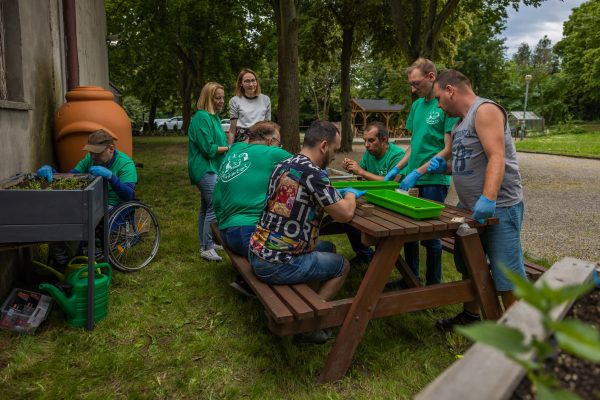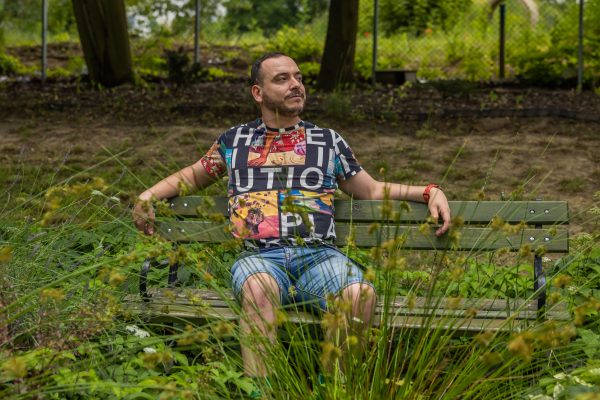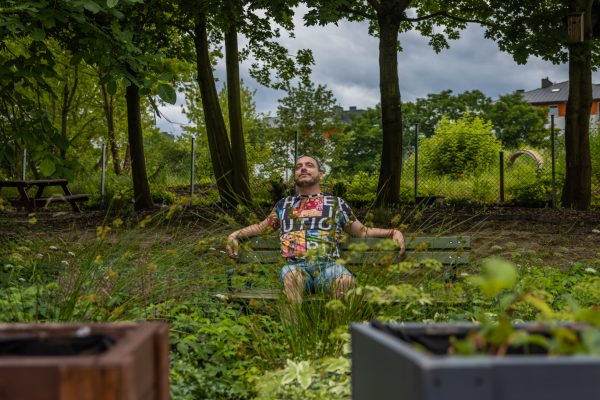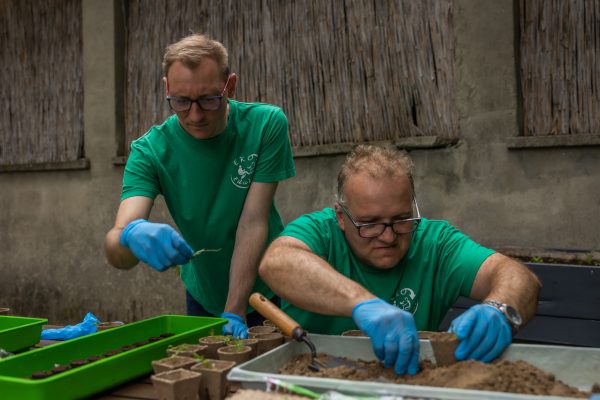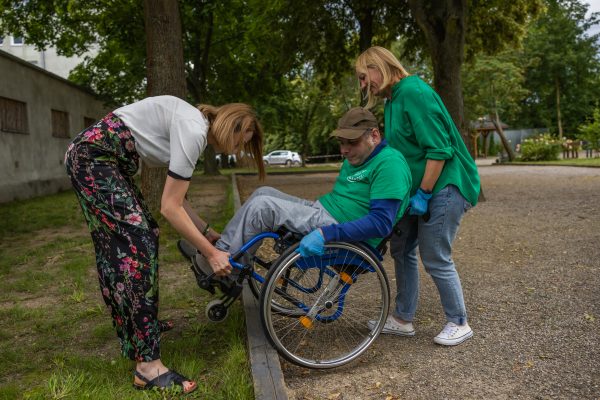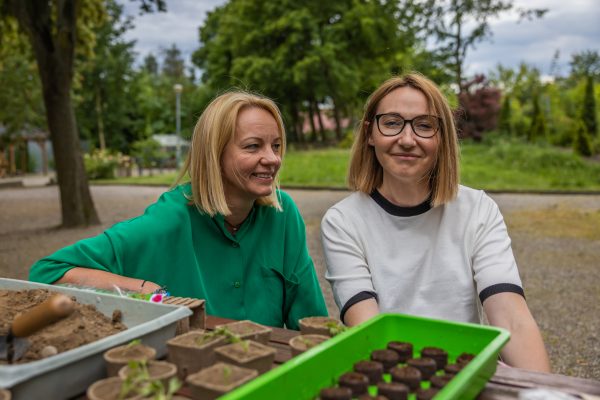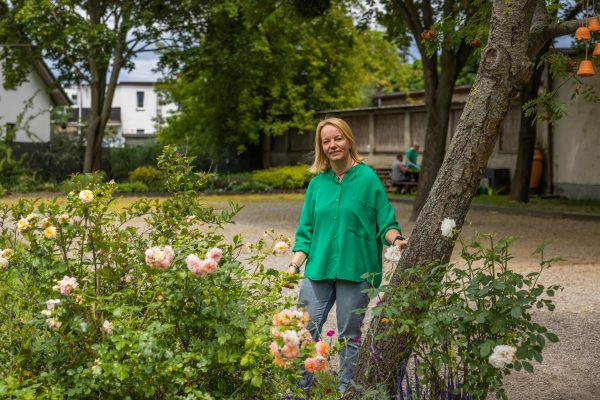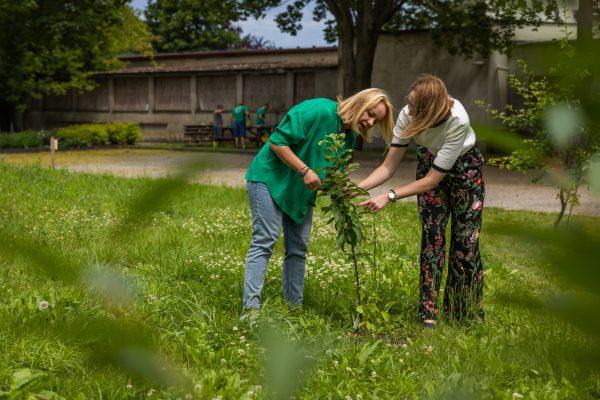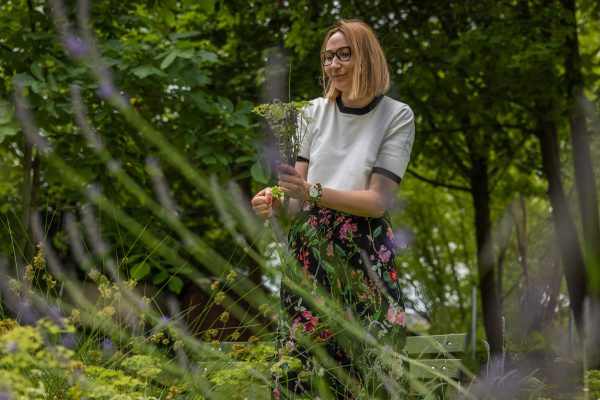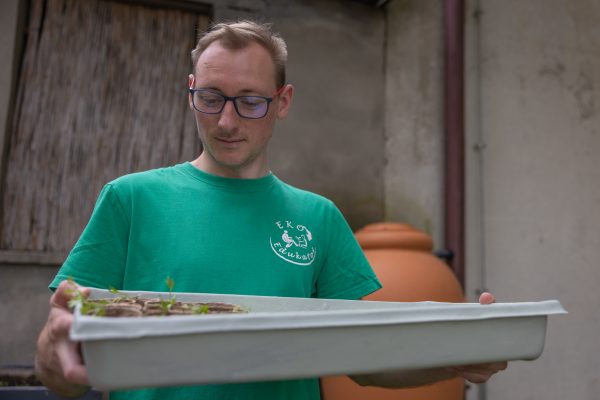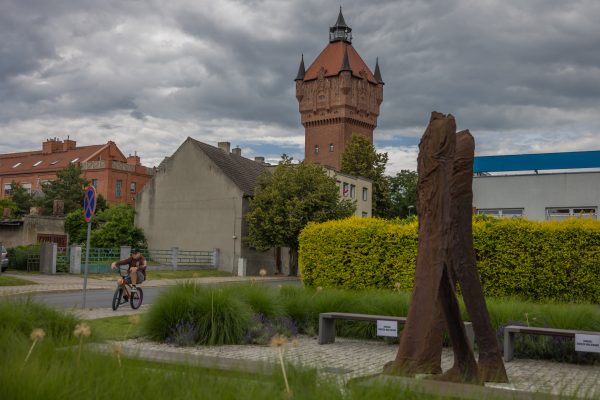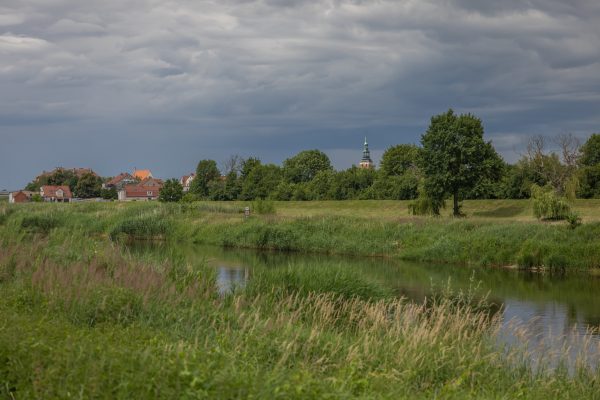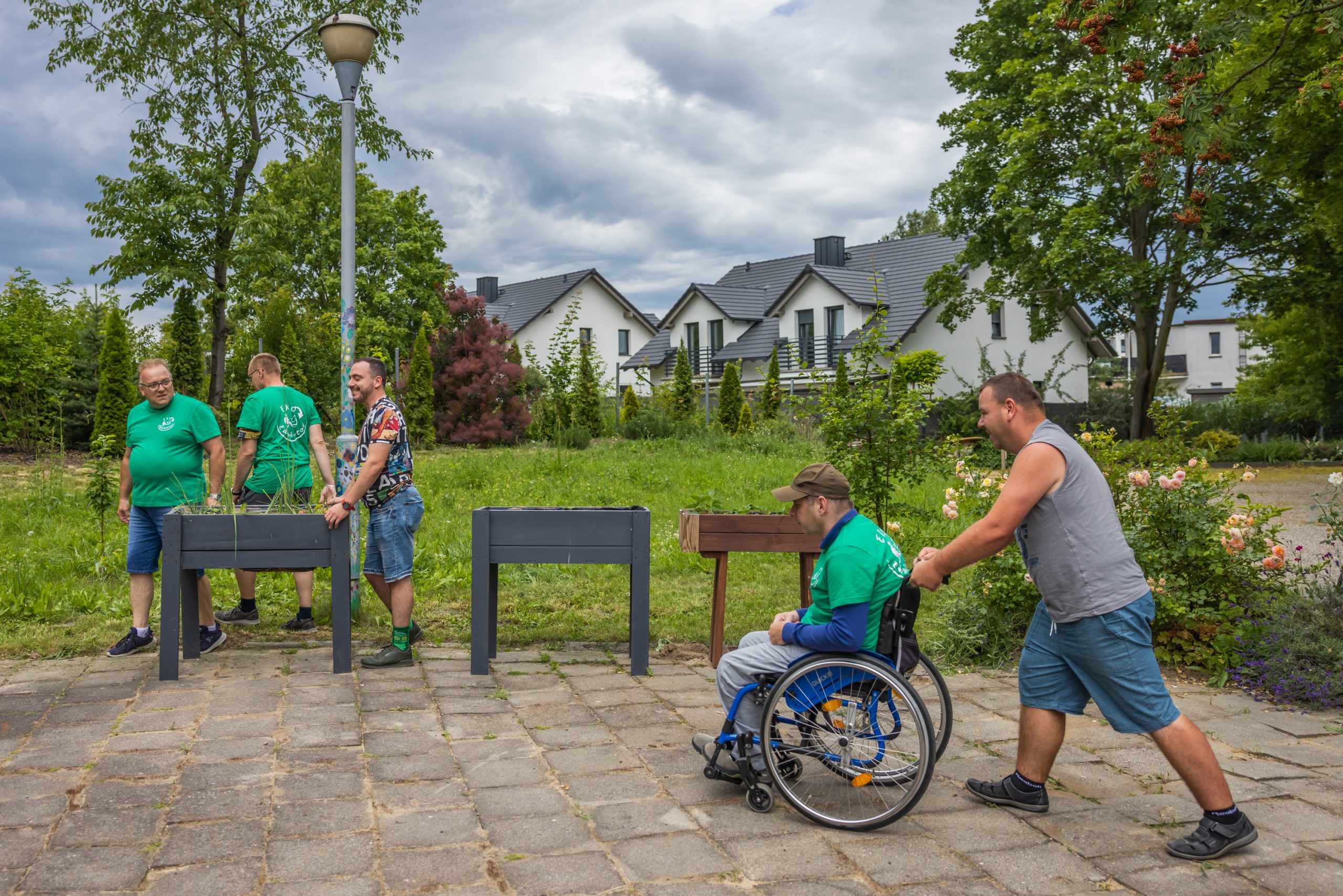
The quiz show Milionerzy (Who wants to be a millionaire) was held at the sports hall in Dąbrów – a small village near Śrem. The music heightened the tension, the audience, all minors, reacted with a level of enthusiasm matching their age. Damian Romański, a forty-year-old from Książ Wielkopolski, played the part of the host Hubert Urbański, and asked the questions: “Is rainwater…” a) hot chocolate with whipped cream b) water from precipitation c) chicken soup d) a banana cocktail. Another question was: “What would you find in a flower meadow? a) a car park b) a shopping centre c) a swimming pool d) colourful, blossoming, and fragrant plants. This quiz marked the end for the children in the sports hall (there were about one hundred of them) of the Eko-edukator project. This is probably the first project of its kind in Poland, in which people with disabilities teach children in kindergarten and primary schools how to plant plants, filter water, and recycle rubbish.
Children build greenhouses
– We made flower bombs with the children – Damian Romański (the same person who played Hubert Urbański the quizmaster) says with a broad smile. Making a flower bomb is relatively simple. All you need is a little bit of turf, add soil, a bit of clay from a fishing store, a little water, and a lot of seeds. You make a ball the size of a snowball, and then, like a snowball, you throw it a long way. – After some time, flowers will grow in the place where it lands. The kids were very pleased when we went outside after lessons and simply threw our flower bombs to make a meadow there. We also made a greenhouse out of five-litre water bottles; you cut off the top to make a flap. Then you tip in soil, plant the seeds, water it, close the flap, and stand it in the sun. That makes cress grow, and then microleaves, which can be eaten. The children really liked these activities, and asked: When are you coming again?” – Romański continues. For seven years, five times a week, he has come from his home town of Książ to Śrem, 16 kilometres away, where the local hospital houses the “Trójka” Śremskie Stowarzyszenie Na Rzecz Osób Niepełnosprawnych (Śrem Association for People with Disabilities), which operates the Occupational Therapy Workshop here.
These workshops are scattered around throughout Poland, and this is a place where adult Poles with various disabilities can attend classes to help them find their place both in society and on the job market. In Śrem, the participants have access to facilities including a workshop for tailor work, gardening and flower arranging, marketing, artistic work, or for instance household activities. As the job market in Poland is not very favourable for people with disabilities, centres like this somehow play a “carer” role. In many cases, the participants will spend long years here, learning new things, such as creating artwork. – We are probably the only workshop in Poland that has its premises in a hospital, but this was the only place available in Śrem. Initially, we thought: “Man, everyone is going to associate us entirely with the hospital”. But it turned that there is a great deal of demand. Our customers are nurses, doctors, and parents, and they buy our products or place orders. We hold fairs, and sell artworks in the “Wutezeria” internet store – Dominika Stefaniak, the head of the “Trójka” Stowarzyszenie na Rzecz Osób Niepełnosprawnych, says.
I used to be a larva
– I am an example of how, no matter in which community you grow up, if you come across good people who see something of value in you, you can get out of any cesspool – Romański continues his story. He is wearing a black T-shirt with the colourful Kurpie emblem and the words “Guy with balls”. He describes his shock when he came to the Occupational Therapy Workshop for the first time: – I decided to do that, because I was beginning to fall into apathy. My friends were working, and I would spend the whole day at my laptop, because I had nothing to do. I was in an environment where alcohol and drugs were the norm, and I didn’t know that there were people who lived differently. I thought that everyone drank alcohol and took drugs. I also had a time of depression, and eventually I decided to come to Śrem. On the first day, I thought that I would not manage. People with various disabilities come here, including intellectual disability. I have a disability as I have cerebral palsy, but I graduated from secondary school and here in my head – Romański points to his forehead and smiles – everything is in working order. I have seen adults here, with one person colouring in pictures in colouring books, and another sticking in a picture of Pooh Bear using crepe paper. – I thought to myself: “Damn, I don’t think I belong here”, but I began to talk to the employees a lot, and they gave me a lot of support. After seven years, this place has become my home, and I consider all of the participants – whether they have autism or Down’s syndrome – as friends. I am not shy with any of them – he says cheerfully. For a number of years, Damian helped in the tailoring workshop, and now he goes to the career centre. The occupational therapy workshops also included psychological therapy. – I realised that I don’t have to pretend, I can be open about my vulnerability. One time, I even came when I was under the influence of alcohol, and these people did not turn away from me, they gave me a chance because they saw something good in me. I started writing poetry. One poem is about pupation. I thought I was an ordinary larva, but thanks to this place I came to believe that I am a butterfly.
Out of 40 people that attend the occupational therapy workshop, the employees selected 15 people for the Eko-edukator project. Damian was one of them.
How are we received by children?
– That was probably the most important project I ever worked on – Monika Dukat says. She is an employment coach, and specialises in projects, and it was she who came up with the idea that perhaps people with disabilities can conduct classes for younger children. – The job market is not interested in people with a moderate or serious disability. Maybe the situation is slightly different in the larger cities, but for me it is difficult even to organise internships for our participants. Employees sometimes tell us: “We don’t want to exploit you”. I say that it is not a question of exploitation, because the people do excellent work for us, but they need an opportunity to practice in different conditions, and realise that they are able to do something, to make a breakthrough and mix with people.
The project was funded from the Active Citizens Fund – National Programme, and lasted two years. For the first year, 15 future eco-educators had to learn to conduct workshops on ecology and gardening, and become a sort of expert in these fields. They created an ecological garden at the hospital in Śrem. A greenhouse was built, and wooden pots were placed there, tall enough for people in wheelchairs not to have to lean over. There was sowing, cutting, and observation, and the gardening and flower arranging workshop participants built houses for insects and hedgehogs as well, using old pallets.
The workshop is cared for by Ewelina Bednarska-Dopierała, an occupational therapist, who was also responsible for devising the scenarios and training the project participants. -We sowed the seeds and watched them become cress, and observed the plants growing – Bednarska-Dopierała says, and presents the materials used for the classes with the children. The seeds were for mango, sinapis, nigella, cardamine, and coneflowers. Cards to help remember new information (“the composition of rainwater is determined by how clean the air is. It contains gases, soot, plant pollen, industrial dust particles, microorganisms, and certain amounts of mineral salts” or “Zero Waste – an attitude towards life in which someone tries to keep the refuse they generate to a minimum”), even recycled plant pots – made from milk cartons. – Whenever we were to go to the children, we held a briefing to discuss exactly what was going to happen – Bednarska-Dopierała adds.
In fact, all of the participants during the year also went to workshops on communicating with children and playing integration games.
– They were also provided with psychological assistance before the classes. They were able to talk about their concerns or fears – Monika Dukat adds.
– and what were they scared of?
– that the kids would ridicule them.
Two parallel worlds
– They were feeling stress, and so was I. They were excellently trained, but I didn’t know how they would handle the pressure of having to make a good impression. When we arrived at a school or kindergarten, it was natural that we would arouse interest. The head teacher appeared, and some other teacher, even the caretaker and cleaners sometimes looked in – Ewelina Bednarska-Dopierała recalls. The schools that took part in the Eko-edukator project were the Dąbrów John Paul II Primary School and Kindergarten, Primary School 2 in Śrem, and the “Kinderki” Śrem Language Study Primary School. The workshops were held regularly in these places, and the school in Dąbrów, which was a partner in the project, hosted the Milionerzy quiz show.
It was found that for most of the eco-educators, the biggest problem was facing the community of people who do not have these disabilities. Very often, in their lives, they integrate and spend time only with other people who, like them, attend similar centres, and therefore they form two worlds, each with little knowledge about the other. – in the Eko-edukator project, we really went beyond our own circles and had something to offer. The project was funded under the Active Citizens – Fund – National Programme, which meant that we had funds for good-quality materials. Our educators had nice, green T-shirts with a logo, and for the children we had nice, funny, gardening gloves. It was even ennobling to take part in the project – Monika Dukat says. – The children were excited that they were coming, and wanted to come into contact with them. There were also surprises – for example on the day of the classes, everyone dressed in green. Another very important thing was that the children asked for help, when usually it is the people with disabilities who are helped, and not the other way round. Our participants were able to put themselves in the other side’s shoes. One boy
had a complex about being in a wheelchair. I put him and the children in a circle – so that everyone was at the same level. That was a wonderful experience from him, because he realised that no one paid any attention to his disability – Ewelina Bednarska-Dopierała adds.
A hug which is astonishing
Kamil is an athlete, and takes part in the special olympics. He has several hours’ training on Tuesday, Thursday, and Friday. If the weather is nice, he walks with Nordic walking poles. He attends the gardening and flower arranging workshop, and has also been an eco-educator. – I remember the children’s faces and hands, black from the soil. However the most amazing thing was that they were smiling – he recalls, smiling shyly. – When we left, the children became sad and quiet, and were very pleased to see us when we turned up again. That was wonderful. For me, as a person with a disability, it was important to show those children something, and teach them something – he recalls. Damian adds: – Every meeting with the children left me with a sense of fulfilment. I could see that we had all made a good impression and that the children were really happy – he says. In the course of the project, Damian found that he was suited to activities with children. He did exercise sessions with the children and encouraged them to play. He had a knack for it. – At the Śrem kindergarten there was a girl with autism. She sat apart and did not join in the activities. At the time, we were playing with a jumping sheet, dancing, and lying down on the floor. I was giving it my all, and soaked with sweat. I was lying on my stomach, and at a certain point I felt someone lie down on me and hug me. It was that little girl with autism! When I stood up, she hung on behind me, making me tip forward, because I was not expecting that – Damian says, evidently enjoying telling the story.
Mysterious garden
The garden that the gardening and flower arranging workshop participants take care of is a community garden. It was created so that some time later various community groups from Śrem could use it. It is undergoing a kind of refurbishment, and soon there will be two shipping container buildings here, with space for additional workshops and sanitary facilities. In part, the money for extending the Occupational Therapy Workshop comes from a prize awarded for the Eko-edukator project when it came first in the XII “Wielkopolska open to people with disabilities” competition, organised by the Wielkopolski Voivodship Local Authority. Journalists reported: “This was an innovative idea that demonstrated that one’s own weaknesses can be overcome, social barriers can be broken down, and deep-rooted myths about disability can be dispelled”.
When the new buildings are erected in the garden, it is very likely that there will be school and kindergarten trips to the eco-activities, especially as the “Trójka” Stowarzyszenie na Rzecz Osób Niepełnosprawnych and Fundacja Origami have in fact set up a social cooperative, “Działalnia” (Action). Since August, five people who took part in Eko-edukator have been going to work at the primary school now being built in Wyrzeka. This will be a school intended to provide support for children with autism. People from the Occupational Therapy Workshop will work there, in the kitchen and garden, and keep the school premises tidy.
– There is still a tendency for people with disabilities to be only the beneficiaries of various services, and for no one to employ them, because they will not manage. But schools and kindergartens can purchase an eco-educator service, can’t they? Many centres do not have their own gardens, and we can invite them to come to us. I think that sooner or later, education activities of this kind will in
fact be among services provided by the social cooperative. On the basis of the know-how that we have developed. We see that some people have the ability to work with kids, and get them interested; they have an inherent warmth and ability to establish a rapport – Dominika Stefaniak, the head of the “Trójka” Stowarzyszenie na Rzecz Osób Niepełnosprawnych” says.
One of the people who from August will leave the Occupational Therapy Workshop and has gone to work at the newly opened social cooperative is Damian: – You only live once, so you have to try different things. I am now 40 years old, and for the time being I do not feel any pain. Life is becoming increasingly expensive, and I will have more money. Seven years ago I would have said something different, but now my view is that every change brings something good, even if we are wary of it at first.
Project „EKO-Edukator” run by Association for people with disabilities “Trójka” from Śrem was conducted using funds from the Active Citizens Fund – National Programme funded by Iceland, Liechtenstein and Norway using EEA Funds.
Text: Ewa Wołkanowska-Kołodziej
Photo: Anna Liminowicz
The report was published on Onet.pl
